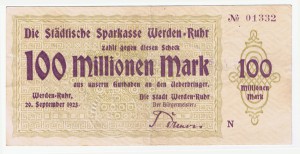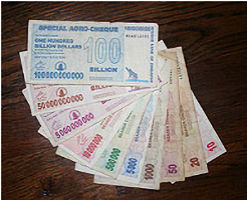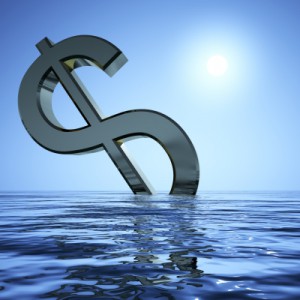Postcards From Weimar Germany Justice Litle, Editorial Director, Taipan Publishing Group Monday, September 20, 2010 The Weimar Republic is perhaps the quintessential example of hyperinflation. But the buildup took longer than one might think. Walter Levy is a German-born oil consultant. His father, a German lawyer, took out a life insurance policy in 1903. Every month he had made the payments faithfully," recounts Levy. "It was a twenty-year policy, and when it came due, he cashed it in and bought a single loaf of bread. Such was life in the German Weimar Republic. Things got so bad there for a while, dentists and doctors stopped asking for currency, seeking … [Read more...]
Which is Stronger- Inflation or Deflation?
By Tim McMahon, editor Why the Printing Press is No Match for Deflationary Forces- A mere two years ago (although it seems like a lifetime) in August of 2008, inflation was roaring in at 5.37% and the world was talking about hyperinflation. But then along came the housing crash which started the domino effect of deflationary forces. Housing prices, stock prices, asset prices all began falling; triggering margin calls and more liquidation until even Gold (the only investment that is not simultaneously a liability) began to feel the deflationary pressure. By July 2009 a mere 11 months later, everyone was no longer afraid of the inflation monster, but now they were fearing deflation. At … [Read more...]
The Primary Precondition of Deflation
By Robert Prechter, CMT Elliott Wave International The following was adapted from Bob Prechter’s 2002 New York Times and Amazon best seller, Conquer the Crash – You Can Survive and Prosper in a Deflationary Depression. Deflation requires a precondition: a major societal buildup in the extension of credit (and its flip side, the assumption of debt). Austrian economists Ludwig von Mises and Friedrich Hayek warned of the consequences of credit expansion, as have a handful of other economists, who today are mostly ignored. Bank credit and Elliott wave expert Hamilton Bolton, in a 1957 letter, summarized his observations this way: In reading a history of major depressions in the U.S. … [Read more...]
Zimbabwe Hyperinflation and the U.S. Dollar
The (Zimbabwean) Dollar - The Point of No Return By John Lee, CFA Last week, Zimbabwe slashed 12 zeros from its currency as hyperinflation continued to erode its value, the country's central bank announced in late January. The government instituted price cuts to arrest inflation. As time went by, it became apparent the forced price cuts cause bare shelves in shops and many businesses to close. "Even in the face of current economic and political challenges confronting the economy, the Zimbabwe dollar ought to and must remain the nation's currency, so as to safeguard our national identity and sovereignty... Our national currency is a fundamental economic pillar of our sovereignty," … [Read more...]
Why the Bailout Won’t Work
By Andrew Gordon The economy is now staring eyeball-to-eyeball with an activist U.S. government. It will legislate, reform, supervise, bully, give out money like cotton candy and get concessions in return. It will encourage technological development in environmental and other “future” industries. It will seek sources of energy other than the oil and gas we get from Mexico, Canada and OPEC. And it will put generous sums of money behind these initiatives. The Obama government emphatically does not want banks to sit on the money they get from the government. Nor do they want it to go to shareholders in the form of dividend payments. This is why I look for more companies to cut their … [Read more...]
What is so bad about Deflation?
By Tim McMahon The average annual inflation rate dropped again this month. At a monthly rate of -1.01% October's drop was touted as "the largest monthly drop on a seasonally adjusted basis since 1947 when the Bureau of Labor Statistics first started tracking seasonal adjustments" and it brought the annual inflation rate off its highs and down to a more reasonable 3.66%. November's monthly rate was almost twice as large at but it was hardly mentioned in the news. This month the annual inflation rate has dropped down virtually zero-- 0.09% with a monthly drop slightly larger than the one two months ago. Just a few months ago the annual inflation rate was 5.6% and now it is … [Read more...]
Deflation or Hyperinflation?
By Tim McMahon, Editor The monthly inflation rate dropped like a rock for the second month in a row. Journalists touted last month's drop as "the largest monthly drop on a seasonally adjusted basis since 1947 when the Bureau of Labor Statistics first started tracking seasonal adjustments". What are they going to say this month when it is almost twice as large? Largest drop since last month? This is real live deflation on a monthly basis (although not on an annual basis... yet). Basically, deflation is falling prices (or more accurately a decrease in the money supply that results in falling prices) while disinflation is a slowing of the rate of increase in prices. Are we in a … [Read more...]
Take action in a Deflationary Environment
Editor’s Note: In the following article Robert Prechter shows you how to prepare for a deflation. By Robert Prechter, CMT The ultimate effect of deflation is to reduce the supply of money and credit. Your goal is to make sure that it doesn’t reduce the supply of your money and credit. The ultimate effect of depression is financial ruin. Your goal is to make sure that it doesn’t ruin you. Many investment advisors speak as if making money by investing is easy. It’s not. What’s easy is losing money, which is exactly what most investors do. They might make money for a while, but they lose eventually. Just keeping what you have over a lifetime of investing can be an achievement. That’s … [Read more...]
Making Preparations and Taking Action in Today’s Deflationary Environment
Editor’s Note: In the following article Robert Prechter shows you how to prepare for a deflation. By Robert Prechter, CMT The ultimate effect of deflation is to reduce the supply of money and credit. Your goal is to make sure that it doesn’t reduce the supply of your money and credit. The ultimate effect of depression is financial ruin. Your goal is to make sure that it doesn’t ruin you. Many investment advisors speak as if making money by investing is easy. It’s not. What’s easy is losing money, which is exactly what most investors do. They might make money for a while, but they lose eventually. Just keeping what you have over a lifetime of investing can be an achievement. That’s … [Read more...]
What is Deflation?
Define Deflation: In common usage deflation is generally considered to be "falling prices". But there is much more to it than that. Often people confuse deflation with disinflation or with Depression (as in "the Great Depression"). These three terms are related but not synonymous. According to Investorwords.com the definition of Deflation is "a decline in general price levels, often caused by a reduction in the supply of money or credit. Deflation can also be brought about by direct contractions in spending, either in the form of a reduction in government spending, personal spending or investment spending. Deflation has often had the side effect of increasing unemployment in an economy, … [Read more...]





